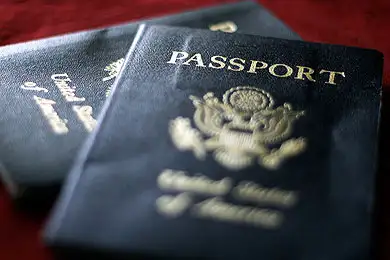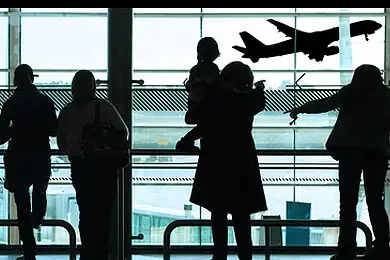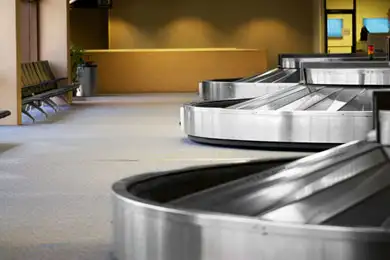Vacations are meant to be happy occasions filled with even happier faces. But sometimes, even the best of travel plans can be thrown off course by an emergency such as an injury, a missed flight or a pickpocket making off with your travel funds. Be prepared and learn what to do if your family experiences an emergency while vacationing.
LOST OR STOLEN PASSPORT

There is no fear greater than a lost or stolen passport, especially when traveling abroad. How in the world will you get home? While this is not going to be an easy fix during your vacation, take a breath: it can be fixed.
What to Do: Contact the local embassy, which you will have to do in order to receive an emergency passport. These will be granted on a limited basis and can get you home; once home you’ll have to apply for a new passport. However, in order to receive an emergency passport, you will need:
- Three passport photos for every person applying for an emergency passport
- A photo ID
- Proof of U.S. citizenship
- Airline ticket, booking confirmation or itinerary
- A police report, if your passport was stolen
- $100 (U.S. dollars) passport application fee
How to Be Prepared: Of course, if you’ve lost your bag or purse, or it was stolen, you may not have any form of ID or proof of citizenship, which will create a bit more of a headache on your part as you call home and ask family and friends to find and retrieve pertinent identification. The best thing to do is be prepared when you travel by creating an emergency passport kit that contains all you will need if you should lose your passport and take it with you when you travel. Keep these materials in a separate bag than your passport, so you do not lose all of it, should anything be lost or stolen.
Another important tip: Keep passports in the hotel safe until you are ready to depart. Once you’ve arrived in your destination and rented a car, you will not be asked to show your passport again; your driver’s license will work as an ID, if needed.
MISSED FLIGHT

These days, missing a flight is more likely to occur due to airport transfers, lines at security, and delayed flights, rather than your family running late in traffic. It’s not fair, no, but it does occur and it’s never easy when you have little ones in tow. Breathe again. It’s going to take some work, but you will eventually make it to your final destination.
What to Do: If the plane has already taken off without you, the first rule of thumb is try to remain calm and be courteous to the airline staff. You’re now in their hands, and kindness is going to do you more good than anger. Immediately go to the airline’s desk and ask if you can get on the next flight. Be prepared that some airlines will require you to pay the price or difference in price due to a missed flight.
It’s more likely with airlines overbooking these days that you and your family can be put on standby, which means you may not make the next flight, but perhaps the next flight. It also means you are going to get whatever seats are available, which most likely will not be together. Talk to the airline personnel to find out what you can do to sit with your children, and if a guaranteed spot of a flight is available, so you know how to manage your time at the airport. (You’re going to be there awhile, so this is the time to find a children’s playground, grab a full meal in a sit-down restaurant, pay the daily fee to visit a club room, etc.)
If there are no other flights, ask about next day flights or flights on partner airlines. If you’re still in your hometown, this may not be as inconvenient an option as when you are in another city and have to book a hotel, but if you do have to book a hotel, check to see if any of the airport hotels offer family-friendly swimming pools and turn the disaster into a family day at the pool. Or, use this time to visit a local museum or attraction, as most areas will have some unique, kid-friendly place to visit. It’s not what you planned, but when life gives you lemons…
One more hiccup: If you checked luggage and missed a connecting flight, baggage is automatically placed on the next flight and may go without you. You’ll want to ask airline personnel if they can locate/track your baggage. If the bags are off to your final destination, ask that the airline safely stow your bags until you arrive.
How to Be Prepared: Although you cannot control airport delays that cause you to miss a flight, you can be sure you don’t miss a flight by being caught up in traffic or long lines at check-in and security. The best rule of thumb is to get to the airport early. For domestic flights, it is recommended you arrive at security at least an hour before the flight. For international flights, arrive at least two hours before the flight. Use your airline’s automatic check-in services available online, and look for self check-in counters at the airport to avoid lines. Check airport Web sites, as well, which may list security line times and their own recommended arrival times, as they may historically have longer check-in and security lines than others.
To be sure you are not personally delayed at check-in or security, be a smart packer. Read the airline’s luggage regulations and be sure the entire family’s luggage meets the weight and size requirements, especially the carry-on luggage. Be sure the carry-on luggage is also packed appropriately, with liquids in 3-ounce-or-less containers all in a Ziploc plastic bag and no sharp or dangerous objects. Have everyone in the family wear easy on/off shoes, remove their coats and sweaters, and remove all metal jewelry, belts and other items that may trigger sensors off and in bins before moving through security.
As of 2013, frequent flyers who don’t want to go through the hassle of partially disrobing at pre-flight security screens are encouraged to enroll in The TSA Pre-Check application program. The program allows low-risk travelers who’ve gone through a thorough pre-screening process (fingerprints, background check, etc.) to go through a more streamlined version of the standard TSA security screening. That means no need to remove your belt or shoes, no need to take take out your laptop and other electronics, and no need to rummage through your bag for any liquids or gels. The cost of the service is $85 and covers you for five years. The best part? Kids 12 and under are allowed through the expedited check point with you, but do not have to pay a fee for the service.
If you have arrived to the airport late, or the check-in line has delayed you, find an airline employee who may be able to assist you in moving in front of the line. (Do not jump the line without an employee granting you permission.)
LOST LUGGAGE

You’ve survived the flight with the kids, maneuvered the airport(s), and have finally arrived at your final destination, eager to get to the hotel. You stand at baggage and watch the belt spit out luggage, but where are your bags? As the last lucky passenger removes the last bag, it’s official: Your bags are lost. Are you remembering to breathe?
What to Do: First, find your baggage claim tickets, you’ll need these before you speak to airline personnel. Many times we just stuff them into our carry-ons without a second thought, which is why many airlines are affixing them to your boarding passes and airline envelopes. (If you do not have your claims, it may take longer to locate your bags, so be prepared by keeping these with you until you and your bags are reunited. Some airports actually match claim tickets to luggage before you can leave baggage claim to ward off theft, so it’s always a good idea to keep your claim tickets.)
Next, speak to airline personnel. Bags may have lost tags in flight and may be in a lost luggage area, or if oversized, may be in an oversized luggage section or baggage claim. Oftentimes, the airlines will know where your bags are, which may be your last destination, if they did not make a connecting flight. In this case, the airlines will put the luggage on the next flight, and you may only have to wait a day to receive your bags. (That said, we once were promised our bags would be put on the next flight and we should expect our bags the next morning. It took five days.)
If the airlines are not sure where your luggage is, it could take a week or more to find the bags and return them to you, which could be your home address after all is said and done. If your bags are lost, the best advice, which is hardest to follow, is to try not to let lost luggage destroy your family vacation. Instead of worrying about the bags every day, and spending hours on the phone to get no new answers, resolve yourself to pick up a few items at a store and try to move forward with your vacation, as planned.
Unfortunately, airlines only offer a tiny stipend that will not cover all the clothes and replacements you will need during a delay. And if bags are truly lost, you will have to make a detailed list of everything in the bag and will only receive the depreciated replacement value of its total.
How to Be Prepared:: There isn’t much you can do to prevent luggage from missing a connecting flight, but there are still a few precautions you can take. Hang on to your baggage claim tickets, as aforementioned, and be sure your name and address are clearly labeled on each piece of luggage. Make sure all other baggage tags and stickers from previous trips have been removed from the bags, to prevent confusion. Do not pack valuables in your bags, which may entice someone to steal your bags (it does happen). And be sure to keep must-have items, such as medications, itineraries, passports, etc., in your carry-on luggage. It’s a good idea to keep one change of clothing packed in your carry-on, just in case baggage is delayed a few hours or a day.
We also suggest picking up something like Trakdot Luggage Tracker, which uses GPS technology to track your valuables, regardless of whether you’re traveling by land, sea or air. The conveniently compact tracker fits in any piece of luggage, and will even alert you — via text message or e-mail — where your luggage is and when it has stopped moving.
LOST HOTEL RESERVATIONS
You made sure your T’s were crossed and your I’s dotted. You made it to your flight early, double-triple-checked your bags, boarding passes, car rental information and you’re positive the windows and doors were locked, and all the lights are off. After hours on the road or in the air, your crew lurches into the hotel, bags and suitcases in tow. You walk up to the reservations desk only to hear the one thing that could make you even more exhausted: “I’m sorry, but I can’t seem to find your reservations.” While it doesn’t happen often, it does happen.
What to Do: First thing’s first — don’t panic! These types of mixups happen and usually result from some kind of internal clerical error (name misspelling, etc.). Make sure you explore all avenues at the hotel before giving up on your reservation. And even then, hotels will usually do their best to make the situation right, often in the vein of free room upgrades, free nights and substitutions. At the very least, they’ll usually do their best to accommodate you, even if it means calling their competition.
The most important precaution you can take to ensure the process goes as smoothly as possible is to keep several printed copies of your reservation information with you. Doing so eliminates all the “maybe’s” and “are you sure’s?” from the situation. At the very least, make sure you write down the confirmation number, the booking service and their contact information. For all the smartphone users out there, apps like TripIt make keeping reservation information (and every detail of your trip, for that matter) together in one organized and convenient place — your phone.
Also, and this is probably more important than you think, but don’t lose your cool. You’d be surprised how far compassion and a smile can go, especially in the service industry.
If absolutely nothing can be done, then — and only then — must you start the mad scramble for new accommodations. Just try not to let this bad experience ruin your vacation!
ILLNESS/ER VISIT

It’s happened a thousand times before: one slip at the hotel pool and a child has split his chin and needs stitches. Problem is, your family is in another state or, gasp!, another country. What do you do? Where do you go? Who do you call?
What to Do: If you’re at a hotel or attraction, find an employee who can call for help and direct you to a local doctor, hospital or pharmacy. Concierge, for example, may have a list of doctors on hand, and will be able to direct you to the nearest hospital, arranging for a taxi or emergency services, as needed. Many local guidebooks also have information listed in the back pages, with details on what to do and what to expect.
Obviously, getting emergency care means acting quickly, but if a child is ill and you’re in need of a doctor, contact your insurance company first. Find out how they handle out-of-network procedures and if there are certain doctors in their network. There’s nothing worse than getting through an illness or emergency to get a whopper of a bill that insurance will not cover. If you can take the extra minutes to talk to your provider, you could save yourself future headaches.
How to Be Prepared: If anyone in the family is currently on medication, keep medication in carry-on luggage so you don’t lose it. Also keep copies of insurance cards, doctor’s phone numbers and addresses, prescriptions, as well as a note from doctors on treatment, in case you need to visit a local pharmacy or doctor while traveling. If you’d like to carry a little less paperwork with you, look into apps like My Medical Info and VaxNation, which store your personal medical information in your phone. If your children are prone to motion sickness, ear infections, or catch a cold when someone near them sneezes, be prepared and keep standard medications with you, just in case. If traveling abroad, check with your doctors prior to the trip to find out if any immunizations are recommended or required.
Don’t forget to keep dentist information on you, in case a crown or filling falls out, a tooth is chipped in an accident, etc.
To avoid injuries when traveling, ask hotels about baby- and childproofing rooms before arrival. Be sure windows and doors are locked and cannot easily be unlocked by small hands. If there are any objects in the room that may be a threat, put them in a closet or a high dresser.
Many companies offer travel insurance, particularly on cruises and longer family excursions. If you’re truly concerned about travel emergencies, look into various packages available.
CAR TROUBLE

Whether driving in your home state or abroad, having car trouble during a road trip can be troublesome, be it a flat tire, a dead transmission, or worse, an accident. Again, keeping calm is key, and then follow these tips.
What to Do: If you can, get the car off to the side of the road, then set out warnings to other cars that your car is immobile by turning on the hazards, raising the hood, and setting out warning triangles or flares. If it’s a flat tire that needs to be changed, have the kids get out of the car and sit far from the road while you change the tire. If it is not something you can take care of yourself, stay in the car and lock the doors, and call for help.
Telephone any roadside assistance programs you may be a member of for help. If you do not have a program or are not in a familiar area, many countries, including those in Europe, have call boxes along the highways that you can use to call for help (return to your car as soon as you have done so). You can also contact your insurance agency or the rental car company, who can get the details of your situation and direct you to help, or contact a towing service for you.
Once the vehicle is towed, if the vehicle is your own and it requires extensive work, ask your insurance company about your policy and if it includes rentals. The work may have to be performed where the breakdown occurred so you do not incur the additional towing expenses, and if it will take a few days or more, you can proceed with your vacation in a rental as the car is being prepared. (That is, if you actually feel like continuing and have any funds left from the repairs.) If you have rented a car, the rental agency can provide you with another rental to continue your journey; they’ll deal with the repairs through their insurance and your insurance agencies (if you elected to use your policy coverage to cover your rental).
How to Be Prepared: Before departing on a road trip in your own vehicle, be sure its maintenance schedule is up to date. Have the fluids filled, check battery fluid levels, have belts and hoses checked for wear and holes, the air filter replaced, check the tires for air pressure and traction, replaced squeaky or grinding brakes, check wipers and lights, and be sure the car is distance ready. Be sure to do this at least a week before you leave so you’re not delayed if any work needs to be done. Stay off cell phones, don’t text, and use rest areas when you get tired. Know the area speed limits and pay attention to cautions and detours.
Keep an emergency car kit in your car. This can include:
- Emergency bottled water/snacks
- Flashlight with fresh batteries
- A basic first-aid kit
- Rope
- A blanket
- Jumper cables
- Small tool kit
- Duct tape
- Paper towels and a roll of toilet paper
- SpareOne Emergency Phone
YOU WERE ROBBED
We’re not trying to conjure up thoughts of your happy family in an alley in a scene out of “Batman,” we’re talking about anything be stolen from your family while vacationing, be it something from your hotel room, your car or person (typically in the form of pick pocketing). It does happen, and families make great targets because we’re often so busy corralling the kids and carrying lots of items with us that we may not be fully aware of a theft.
What to Do: Of course, call the police and report the crime. If the theft occurred in the hotel room, contact management at the hotel. Unfortunately, pickpockets are not likely to be found, and your stolen items are not likely to be recovered. Hotels are also not responsible for stolen items, even if the items were kept in the room safe. If your credit cards and wallet were stolen, contact your banks right away so they can stop the cards from being used. If a thief used any credit cards, creditors will often credit the charges back to you. Debit cards may be trickier, depending on the bank. Some banks will put the funds immediately back into your account while others may take a few days to analyze the case. If possible, visit a local branch of the bank to receive new cards to use. If you are abroad, ask you bank about withdraw options at local banks. If driver’s licenses were stolen, contact your state about receiving a temporary ID, and use your passport that you kept safely away from your wallet (right?) as your primary ID.
How to Be Prepared: In the hotel room, be sure to lock up. While luggage locks are not suggested at airports anymore, just begging to be broken off by security professionals, use luggage locks to keep bags locked in the hotel room or in vehicles. Don’t leave money or jewelry lying around the hotel room; be sure to carry them with you or lock them in the hotel safe. Don’t bring very valuable and/or flashy jewelry on your trips. The hotel safes are very safe and easy to use; store items like iPods, laptops, battery packs and cameras in the safe, even when going down to dinner or to use the hotel pool.
When out, men should keep wallets in front pockets or attached to a chain or a belt. Women should keep purses closed, zipped and in the front of the body. Wear your coat over your purse, to further ward off theft. Be wary of carrying valuables in backpacks: thieves have been known to be quiet and fast when slicing open the bottom of a backpack and grabbing contents like video recorders. If packs and purses have multiple compartments, keep the most valuable items on the inner pockets. When in crowded spaces like subways and elevators, keep a hand on your wallet or purse.
If you’re trying to minimize as much bulk as possible while on the go, look into things like Coin, a new piece of technology that allows you to consolidate all of your debit, credit, ATM and rewards cards into one single piece of plastic. And, as everyone knows, the less things you have to keep an eye on while on vacation, the better.
Losing cash will wreak havoc on your trip and cannot be replaced. Don’t keep large amounts of cash on you or in the hotel, using your debit card to make withdrawals when you need more. If you’d prefer to carry your travel funds with you, use travelers’ checks that can be replaced if lost or stolen.
This article has been updated as of December 17, 2013.
Our team of parents and travel experts chooses each product and service we recommend. Anything you purchase through links on our site may earn us a commission.






